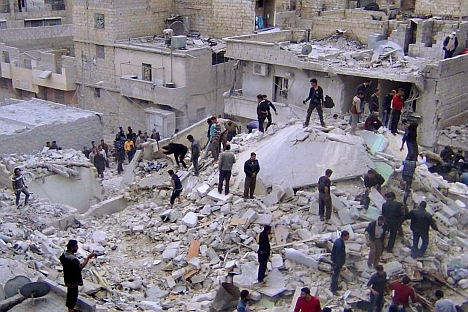US, Russia grapple with Syria dialogue

The forthcoming US-Russia diplomatic exchanges in Moscow next week regarding Syria could turn out to be the real ‘game-changer’. Source: AP
This is against the backdrop of speculations that chemical weapons have been used in Syria and the ‘red line’ Obama had set at one point has been crossed.
In the press conference, here, Obama put caveats on the ‘red line’ and on what constitutes a ‘game changer.’
His main argument is that there has to be “hard, effective evidence” of the use of chemical weapons first, which means “how they were used, when they were used, who used them” on the basis of which Washington could discern a “chain of custody that establishes what exactly happened.” In sum, the job in hand is to establish “a clear baseline of facts.”
Thereupon, it is not simply enough if the US alone is convinced. The international community also needs to be convinced. Or else, Obama warned, the US won’t be in a position to “mobilize the international community to support what to do.”
Therefore, Obama explained that when he said the use of chemical weapons would be a “game changer”, he didn’t mean it as “a position unique to the United States.”
As he put it, “if I can establish in a way that not only the United States but also the international community feel confident is the use of chemical weapons by the [Bashar al-] Assad regime, then that is a game changer.”
But then, what is this ‘game changer’ business all about? Does it mean military action? Not necessarily. Obama has clarified, “By game-changer I mean that we would have to rethink the range of options that are available to us.”
He explained that the US is already involved in Syria but has not yet deployed certain options “that are available to me that are on the shelf right now that we have not deployed. And that’s a spectrum of options… And I won’t go into the details of what those options might be, but clearly that would be an escalation.”
Clearly, Obama’s lengthy explanation will help an easing of tensions on the WMD issue. That in turn allows the focus of attention now to turn to the diplomatic track. The talks that the US secretary of state John Kerry would have in Moscow during his ‘working visit’ on May 7-8 assume significance. Kerry mentioned Syria among the items on his agenda.
In retrospect, the WMD controversy may have helped clarify the battle lines on the political and diplomatic chessboard.
What emerges is that there have been dissenting voices amongst the US’s European allies as regards military intervention in Syria. The principal amongst them would be Germany whose Defence Minister Thomas de Maiziere is on record that while Berlin is supportive of “political pressure” on the Syrian regime, it currently doesn’t “see a role for the military,” rejecting virtually the whole concept of ‘red line’ and ‘game-changer’.
Again, British MPs who recall the faulty intelligence reports of the Tony Blair government regarding Iraq in the run-up to the war in 2003 have demanded evidence of the use of chemical weapons in Syria. “A greater degree of certainty is required before taking decisive action. We need to have more intelligence, more corroboration,” the Conservative chairman of the House of Commons foreign affairs committee Richard Ottaway has been quoted as saying.
Ironically, even the Republicans in the US Congress while taunting Obama over the ‘red line’ in Syria, nonetheless caution against sending in American troops. Even Senator John McCain added his voice to the chorus – “The worst thing we could do is put boots on the ground [in Syria].”
Thus, the forthcoming US-Russia diplomatic exchanges in Moscow next week regarding Syria could turn out to be the real ‘game-changer’. Interestingly, Foreign Minister Sergey Lavrov made some warm personal references to Kerry as a professional and a pragmatist.
In a recent interview with Foreign Policy magazine, Lavrov said, “Kerry is a professional. He is pragmatic. And this is a very important quality for a diplomat and especially for a Secretary of state. He has very good knowledge of things around the world. He has keen interest in moving some of the old problems out of the deadlock, and we discussed with him potential joint efforts.”
Lavrov then went on to give a positive assessment of the state of play over Syria:
“And speaking of the Syrian situation in general and about the American position and the Russian position, we [Russia] have been listening for a couple of years during the previous administration of President Obama. We have been hearing appeals to us to change our position… And I’m gratified to note some positive change, which occurred on the part of those who have been denying any possibility for a dialogue as long as President Assad is in Syria. We have been consistent.
“Now, we have been, you know, witnessing a very welcome change. Not only from Washington, Paris and other European capitals, but also from the Arab countries who are now saying things which they did not say before, namely that there must be beginning of a dialogue… Yes, they are putting in some preconditions, like acceptability of negotiators… But the main thing is that both players express the desire for a dialogue. And the rest is doable by diplomatic means. And that is where international mediation could help.” Lavrov interview is here.
All rights reserved by Rossiyskaya Gazeta.
Subscribe
to our newsletter!
Get the week's best stories straight to your inbox
